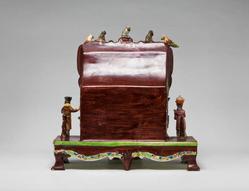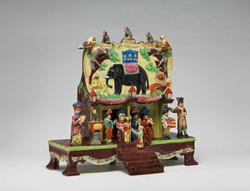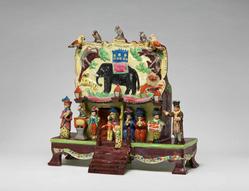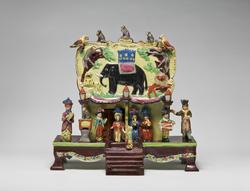Current Location: Gallery 27 (Glaisher)
Titles
Polito's Menagerie
Maker(s)
Maker:
Unidentified Pottery
Entities
Categories
Description
Earthenware figure group, moulded and modelled, lead glazed and painted with polychrome enamels.
Stafforshire table-base group representing Polito’s Menagerie. The table base has six feet and is painted brown, with relief polychrome garlands all around. A yellow and brown booth stands on it; there are three lamps and gathered curtains along the front of the roof and a brown flight of steps centre front. In the middle, a woman is coming out of a door, there are two children in front of her. To the right are the showman, a boy playing a drum and two trumpeters in long coats ; to the left are a woman in a feathered hat and a man who winds a barrel-organ on which a monkey is seated. Above the booth is a tall façade with an elephant with a castle on its back, two monkeys in trees, a lion and a tiger, all moulded in relief. The façade carries modelled birds and monkeys along the top of a ribbon with the impressed inscription: ‘POLITOS / MENAGERIE OF THE MOST WONDERFUL BURDS AND BEASTS FROM MOST PART OF THE WORLD, LION etc.’. The ‘S’ of ‘POLITOS’ is reversed. The back is flat, curving up the back of the façade and painted brown. The underside is glazed but unpainted, with three circular vent holes.
Notes
History note: Puttick and Simpson, London, 15 June 1923, lot 86, bought for £8.8s (eight pounds eight shillings) by Mr Mack for Dr J.W.L. Glaisher, FRS, Trinity College, Cambridge.
Legal notes
Dr J.W.L. Glaisher Bequest
Measurements and weight
Height: 33.7 cm
Width: 34 cm
Acquisition and important dates
Method of acquisition: Bequeathed
(1928-12-07)
by
Glaisher, J. W. L., Dr
Dating
19th Century, first half
Circa
1825
CE
-
Circa
1830
CE
Note
Earthenware figure groups were popular from around 1810, although the earliest examples date from nearly a century earlier. A cheaper alternative to porcelain figures, they were often produced by small potteries; very few are marked. Classical or literary subjects were frequently copied from porcelain examples, but potters increasingly turned to scenes from everyday life and topical events. Early groups are often complex, with modelled and moulded parts, applied decoration and partially decorated backs. As demand increased, processes were streamlined for mass production and by c.1835 three-part press-moulding had largely replaced earlier methods. Table-base groups, on four or six short legs, were made from c.1825-35; probably by just a few makers. They have in the past been attributed to Obadaiah Sherratt of Burslem, but without clear evidence. The large number of modelled figures here suggests a late 1820s date.
Pottery models of Wombwell’s and Polito’s Menageries were equally popular, and there are a number of surviving examples. Versions on different table or other bases suggest they were made by several potters and sometimes the figures seem to have been made by different potters and/or moulds shared between potteries, perhaps to save costs. Figures of individual menagerie animals were also common.
Travelling menageries were popular in England from the late 18th Century. Exotic animals, such as lions and elephants had previously only been seen in aristocratic collections; now menageries took them out to the general public. From c.1830s, with the addition of animal tamers’ tricks, brass bands and human performers, the shows evolved into what we now know as circus. Stephani Polito bought the Exeter Change Menagerie, already established in London c.1810. He died in 1814, but Polito’s Menagerie continued until c.1836. George Wombwell started his first menagerie c.1807 and by 1839 Wombwell’s Menagerie included 15 wagons of animals; by 1850 there were three shows touring; the business continued until 1884.
People, subjects and objects depicted
Components of the work
Decoration
composed of
enamel
( blue, green, yellow, pink, flesh-pink, red, brown, grey, and black)
lead-glaze
Parts
Materials used in production
Earthenware
Techniques used in production
Lead-glazing
Inscription or legends present
- Text: No. 4211. Staffordshire group of Polito’s Menagerie. It is practically perfect. b. in London June 15 1923
- Location: Underside of base
- Method of creation: Rectangular paper label handwritten in black ink
- Type: Label
Inscription present: The ‘S’ of ‘POLITOS’ is reversed
- Text: POLITOS/ MENAGERIE OF THE WONDERFULL BURDS AND BEASTS FROM MOST (PART OF) THE WORLD LIONS & C
- Location: On front
- Method of creation: Impressed
- Type: Inscription
References and bibliographic entries
Identification numbers
Accession number: C.965-1928
Primary reference Number: 76465
Old object number: 4211
Stable URI
Audit data
Created: Saturday 6 August 2011
Updated: Monday 29 April 2024
Last processed: Tuesday 15 July 2025
Associated departments & institutions
Owner or interested party:
The Fitzwilliam Museum
Associated department:
Applied Arts
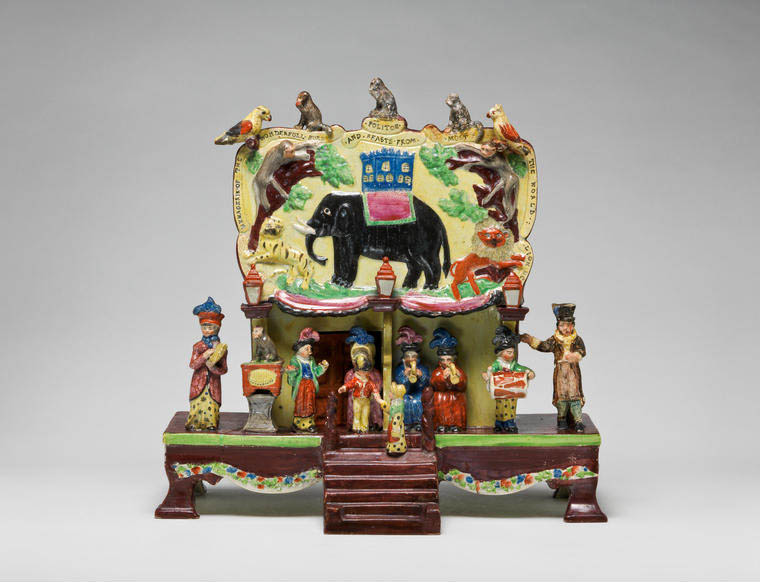
 IIIF Manifest
IIIF Manifest
